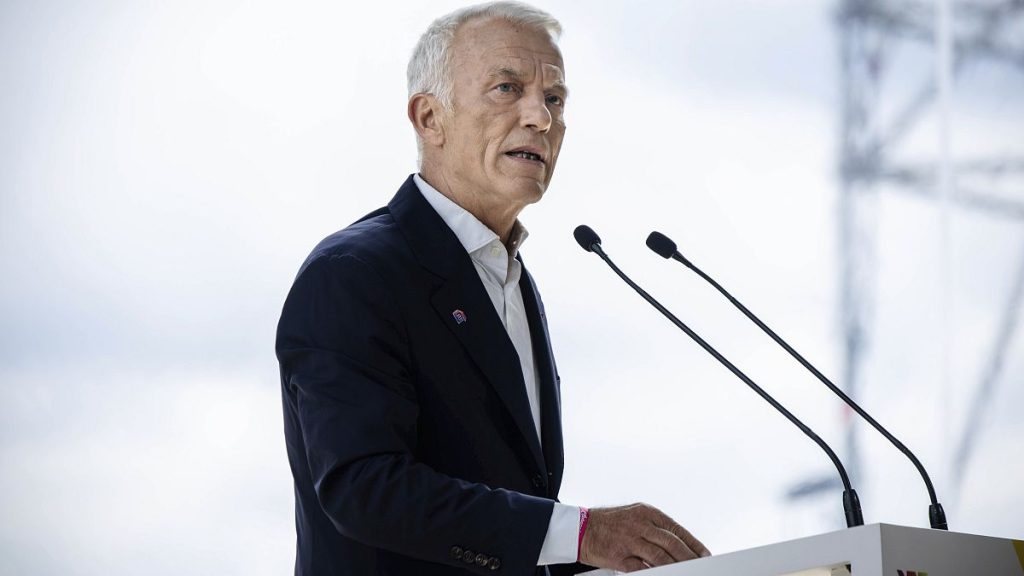France is grappling with a precarious economic situation, characterized by a ballooning budget deficit and political gridlock surrounding its fiscal commitments. The government is currently engaged in negotiations with various political parties, seeking to garner support for its 2025 budget bill, a crucial step in addressing the country’s financial woes. The central challenge lies in navigating the complex political landscape while simultaneously implementing necessary economic reforms, a task further complicated by the legacy of the controversial pension reform. This reform, which raised the retirement age to 64, remains a contentious issue and has the potential to become a bargaining chip in the political negotiations. The government is under immense pressure to balance fiscal responsibility with social considerations, as it seeks to regain control of its finances and restore investor confidence.
The head of France’s largest employer federation, Medef, has issued a stern warning against compromising the effectiveness of the pension reform in an attempt to appease political opponents. Patrick Martin, chief of Medef, emphasized the urgency of the situation, stating that now is not the time to revisit the reform, given the prevailing economic challenges. This stance underscores the delicate balancing act facing the government, which must reconcile the need for fiscal consolidation with the potential political fallout of maintaining an unpopular reform. The government’s attempts to secure parliamentary support for its budget bill will undoubtedly be influenced by the ongoing debate surrounding the pension reform. The outcome of these negotiations will significantly impact France’s economic trajectory and its ability to address its burgeoning debt.
The current economic climate is marked by a widening budget deficit, projected to reach approximately 6.1% of economic output in 2024. This increasing deficit elevates the cost of debt repayment for France, adding further strain to its financial resources. Furthermore, the prevailing economic uncertainty creates a hostile environment for new investments, further hindering the country’s ability to stimulate economic growth. The government’s efforts to secure parliamentary backing for its 2025 budget are crucial to restoring investor confidence and demonstrating a commitment to fiscal responsibility. The budget negotiations are taking place against a backdrop of economic fragility, making it imperative for the government to strike a balance between austerity measures and measures that support economic growth.
The political landscape is further complicated by the recent failure of the previous government to secure parliamentary support for its budget bill, leading to its collapse. Prime Minister François Bayrou is acutely aware of this precedent and is determined to avoid a similar fate. The pension reform, with its inherent unpopularity, presents a potential bargaining chip in the ongoing negotiations. The government must carefully consider the implications of potentially modifying the reform in exchange for political support. Such a move could appease certain factions, but it also risks undermining the government’s commitment to fiscal responsibility and alienating other stakeholders. The political stakes are high, and the government’s ability to navigate this complex terrain will be critical to its success.
The finance minister, Éric Lombard, has acknowledged that all options are on the table regarding the pension reform, suggesting a willingness to consider modifications. Prime Minister Bayrou is scheduled to outline the details of the new budget plan in a policy speech on January 14th. The government is aiming for a deficit target of between 5% and 5.5% in 2025, a slightly less ambitious goal than the previous government’s target of 5%. This adjustment reflects the challenging economic context and the need to secure political consensus. The upcoming policy speech will be a crucial moment for the government to demonstrate its commitment to addressing the country’s economic challenges and outline its strategy for achieving its fiscal targets.
The Governor of the Bank of France, François Villeroy de Galhau, has emphasized the urgency of the situation, highlighting that France’s debt levels have surpassed critical thresholds. He stressed the importance of returning to a deficit as close as possible to 5% of GDP in 2025, urging a figure clearly below 5.5%. Villeroy’s remarks underscore the gravity of the situation and the need for decisive action. He argued that lowering the deficit would not necessarily come at the expense of economic growth, but rather that it would bolster investor confidence and thereby contribute to economic expansion. This perspective emphasizes the interconnectedness of fiscal responsibility and economic growth, underscoring the importance of addressing the budget deficit in a sustainable manner. The government’s ability to successfully navigate these challenges will have significant long-term implications for the French economy.














